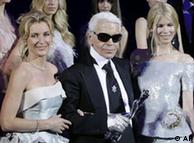While the desolate financial situation is undoubtedly hurting fashion sales, there is also the question of how it is impacting design. With penny-pinching becoming the name of the game, will fashion houses be forced to dream up noticeably different clothing confections?
Susanne Sixtus, a lecturer at Dusseldorf's Private Fashion School and an independent designer, said shoppers may become increasingly quality-focused, buying clothing that they know will last a long time.
"Short-lived trendy clothing will not be popular either," she said, adding that timeless pieces may become even more sought after.

Bildunterschrift: "My clothes never make women look overdressed," says Schwarzer
The classic little black dresses in Dusseldorf designer Barbara Schwarzer's current collection seem to speak to German women who are becoming more mindful of the money they spend on fashion.
"Comfortable and travel-friendly" is how Schwarzer describes her collection. "And the little black dresses have sleeves. That's very important."
Cocktail dresses with added fabric do seem like a bright idea when attending Christmas parties in chilly temperatures, and with this design detail Schwarzer exposes Germans' practical side when it comes to fashion.
"Germans are so practical," said Sixtus, who primarily designs bridal wear at her own atelier. "They buy wedding dresses that they can dye another color to wear for another event, or they purchase two-piece dresses and wear the top part again to a friend's wedding."
In view of the current economic crisis, Sixtus wondered if Germans might take this practicality to an even higher level when shopping for clothes.
More money, more leg
One thing that seems uncertain is whether extravagant and even sexy trends will have a place in the failing economy.
"Hem lines rise and fall with the stock market," the old saying goes, and according to Mara Michel, manager of the Association of German Fashion and Textile Designers (VDMD), this certainly applies in Germany.
"In the 20s between the wars, there was an absolute lust for life and this strongly influenced fashion," she said. "More leg, more cleavage and more emphasis on the body."

Bildunterschrift: Großansicht des Bildes mit der Bildunterschrift: Hem lines rise and fall with the stock market, or so the saying goes
So will designers be shelving their mini-skirt sketches in favor of floor-length gowns? Sixtus does not think the impact the financial situation could have on design will be perceived much in Germany, simply because there are hardly any top, well-known designers here.
"Germans are not artists when it comes to fashion," she said. "We are known for engineering."
Why has the country come up short in fashion?
"No companies want to invest in fashion," Sixtus said. "The textile industry has been in a crisis for twenty years."
VDMD manager Michel agreed that the branch had been suffering long before Lehman Brothers filed for bankruptcy in September.
"Collections have not been able to afford production and have not received any advance financing," Michel said. "There is a general deficit in financial support."
Globalization is also presenting a threat. In September, Hamburg-based designer Jil Sander's eponymous luxury fashion house was bought buy Onward, Japan's largest fashion apparel company.
Looking great always in style

Bildunterschrift: Großansicht des Bildes mit der Bildunterschrift: Some Germans with style
But it may not be all doom and gloom for Germany's fashion industry.
"People marry more in times of crisis," Sixtus said. As a bridal wear designer, perhaps her business will really start to boom. Women's wear designer Schwarzer also thinks fashion has its place in a failing economy.
"We love to party and dress up in bad times," she said.












No comments:
Post a Comment